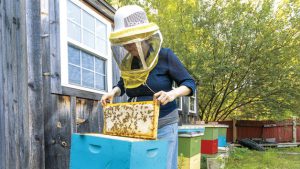Plan Bee: As Problems Assail the World’s Bee Population, Wellesley Scientists Step In
Catherine O’Neill Grace
In spring 2020, Heather Mattila, professor of biological sciences at Wellesley, was awaiting a shipment of honey bees for the hives on campus when it became clear that normal academic practice was in jeopardy.
“We didn’t know what to do or where to go or what life would be like,” she says. “So I just brought the bees home instead of bringing them to campus.”
Mattila lives in Boston, adjacent to the Arnold Arboretum. “I’d never had them at home before as a practice. But ever since the pandemic, I’ve had bees in the yard every year because they are so relaxing. It’s like watching a waterfall.”
Mattila grew up in Thunder Bay, Ontario. “At the time—you know, everything’s shifting now—but at the time, it was the northern limit of where people kept bees,” she says. “I remember seeing the hives at one particular house, but honey bees weren’t a thing for me until I was in university, the age of the students that we have at Wellesley.”
Mattila studied zoology at the University of Guelph, which for decades had one of the largest bee departments in the world. She ended up taking a bee biology course—and found her topic. “I’ve just always loved animals, and I love social animals. I love watching humans interact. I love watching the dogs we’ve had over my lifetime interact. And honey bees are really an extension of that,” she says.

Heather Mattila checks on a hive. Photo provided by Lisa Abitbol
At the beginning of the semester, Mattila takes students in her introductory biology class out to meet the bees. “It’s never easy to meet bees,” she says. “Even for me, it wasn’t. I wanted to shove my hands in my pockets for the first week that I worked in a bee lab. But there’s something about bees that just clicks with people.” Students new to bees are often surprised that the hives smell wonderful, and the bees’ buzzing—the humming of the hive—is soothing and peaceful. “You know how the students enjoy puppy therapy during exams? Bees can have that effect,” Mattila says.
Honey bees are an ideal research subject for undergraduates, Mattila says. “When you study animals, you want to see them actually operating in their natural environment—and bees can be kept and observed right on campus.”
Now that the Wellesley hives are back on campus, students are swarming to Mattila’s lab to learn about these creatures, which, as pollinators, are central to global food production. The world needs bee researchers, because bees, both domesticated and wild, are in danger. Threats include climate change, habitat loss and fragmentation, pathogens, pesticides, and agricultural practices that affect bee diversity. Understanding bees has never been more important. We spoke to scientists who have gone out from Wellesley to conduct research in the lab and in the field.
We are here to share current happenings in the bee industry. Bee Culture gathers and shares articles published by outside sources. For more information about this specific article, please visit the original publish source: Plan Bee: As Problems Assail the World’s Bee Population, Wellesley Scientists Step In | Spotlight | Wellesley College








